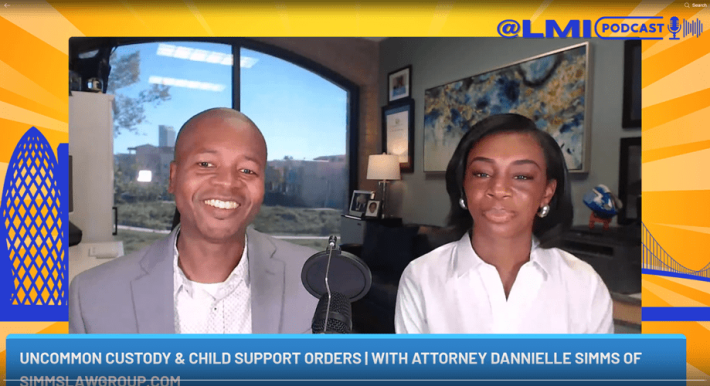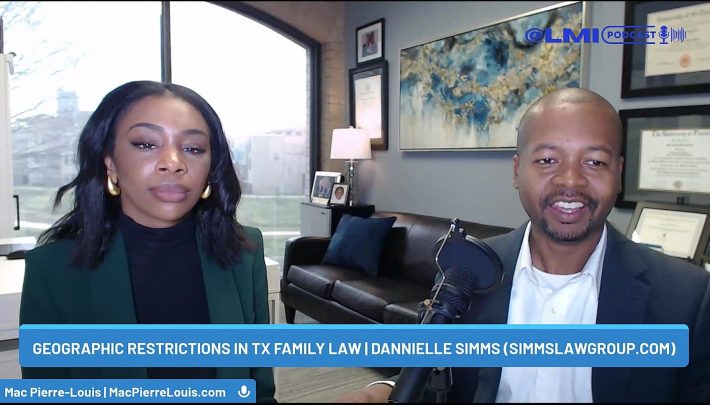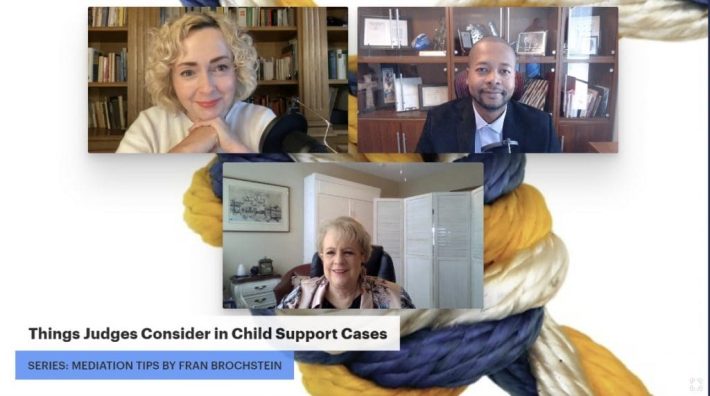EP255 3 TikTok with Sherell Carter

Sherell Carter of JusticebyCarter.com joined Mac of MacPierreLouis.com discusses the following:
Should Fathers Put Themselves on Child Support?
To Lawyer up or not When Dealing with the Child Support Office
Pros and Cons of 50-50 Custody
TRANSCRIPT OF : Pros and Cons of 50-50 Custody
0:01 Welcome back, everybody.
0:02 Pierre-Louis, attorney, mediator, arbitrator.
0:04 Welcome back to the LMIPodcast.com.
0:06 All right, with attorney Sherell Carter.
0:08 And this time we are on part three talking about pros and cons of 50-50 or what is 50-50 custody.
0:18 We hear this term a lot these days, Sherell.
0:20 It’s become more popular over the last few years, I think.
0:25 You have a lot of, I guess, father’s rights advocates who have been pushing for this around the country who are basically arguing, look, a child doesn’t belong to just one parent, a child belongs
0:38 to both.
0:38 And so both parents should have equal decision making and equal time with the child in order to, you know, help raise a healthy young kid.
0:51 And so I’m sure you’ve gotten the calls and I have, you know, from people, especially men, who want to.
0:60 quote unquote 50-50 custody or 50-50 conservatorship or 50-50 possession and access.
1:05 What are some of your thoughts on where this is going?
1:09 All right, 50-50 on possession and access and conservatorship or custody.
1:14 I want to start this off by saying this is very controversial.
1:17 I’m not, I want to I want you to know I’m not like all four on either side is definitely a case by case basis that I would recommend on this, these type of situations.
1:30 And so I also want to preface this by saying that this is not something that you would generally off on a face on just a typical conservatorship case that you’re going to get in court, right?
1:43 These 50-50 type agreements generally happen when you have an attorney that’s fighting for interest, you know, on your behalf.
1:49 So this isn’t going to be, Hey, OAG, I want 50-50, you’re gonna have a private attorney to be able to help you enforce this type of right and so typically where I see this at I will start with,
2:00 let’s say, generally, the parties have been together.
2:04 Maybe it was the father who was the primary person.
2:08 Maybe he stayed at home, maybe he was unemployed, maybe the mom made more money and so forth.
2:12 And so he was typically, could have been, the primary caregiver.
2:16 And so they split up and let’s say he now has to get a job.
2:21 But the child is used to being with the father, right?
2:23 And I’ve seen it in instances to where, let’s do a week on, week on Like that gets the child one week, mom gets the child the other week.
2:31 But there is no order, right?
2:32 They just have been doing this because at the time, they thought it was genuinely the best interest for the child.
2:37 It worked for their schedules.
2:39 It worked for their work week.
2:40 And then sometimes a parent just decides, you know what?
2:43 Somebody may say, hey, girl, you don’t got to let them say your kids.
2:45 Like, you just do what you want to do.
2:46 There’s no order.
2:47 And she just stops.
2:49 Or he just stops, right?
2:50 And all the other parents cut off, right?
2:52 I think those make great, great, great cases in court to be able to go and
2:58 We’ve been doing 50-50 this entire time, and the other party just stopped it because I got a new girlfriend, or he got a new boyfriend, or they upset they’re mad, right?
3:08 The judges can be able to see and look at that.
3:10 And once again,
3:12 the cornerstone of family law cases is the best interest of the child.
3:16 And so the question is gonna be, if you’ve been doing this an entire time, what has changed that is no longer it’s in the best interest of the child, right?
3:26 So that would be one of my arguments in that regard as for a 50-50.
3:31 But the flip side to that is more often than not, I do get fathers that they wanna be there, right?
3:38 Maybe we haven’t been doing a 50-50 arrangement.
3:41 We just now split up.
3:42 Nobody’s just exclusively had the child.
3:45 And now, I want more than to be a weekend warrior, right?
3:50 I wanna see my kid more than on the weekends, right?
3:53 These come into agreements with the mom, right?
3:56 And so, I often tell my clients that are women, right?
4:01 Think of the life that you can have.
4:04 Often as mothers, we’re the bad parents.
4:07 We have to be the ones to get them up to school, do on their homework, clean in their room, you know, doing chores.
4:14 Here is, you know, that comes in on the weekends and takes them to the mall or, you know, takes them to an event in parks.
4:21 So that’s generally seemed to be the fun parent, right?
4:24 That doesn’t always have to be the case You have options.
4:28 You can create your own custom agreement.
4:30 It doesn’t have to be with the guidelines say of the first, third and fifth for the other, you know, the other parent.
4:38 You can generally say, hey, let’s split the time.
4:40 Like, I want to start dating.
4:42 I want to be able to have a life and not have my child be involved and see what’s going on.
4:46 I want to be able to be a woman and enjoy life.
4:49 Why he’s out there flalic, frolic and around.
4:51 You guys can generally create a plan that’s custom to where.
4:56 you can do a week on, week off, right?
4:59 And sometimes that may not work.
5:01 Maybe distance is an issue, maybe work schedule is an issue.
5:05 You can also do a split week.
5:07 I’ve done situations to where like maybe, you know, mom gets, you know,
5:14 Monday through Wednesday or Monday through Thursday and dad gets, you know, Friday through Sunday or you rotate that every week or mom can get Thursday through Sunday, dad gets Monday through
5:24 Wednesday There’s so many things that you can do when you have a private attorney and two parties that are generally looking to just come up with an agreement to where they feel that their interest is
5:37 being heard and represented.
5:39 There’s so much that you can do.
5:40 And in those instances, I’m definitely
5:45 a big, I’m a big, you know, advocate of the 50-50.
5:48 Yeah, so what about connecting to money?
5:50 ‘Cause you might hear some mom say, that only 50-50 because you just want paid child support.
5:57 And the father might be like, well, that kind of proves the point.
6:01 He just wants this because of the money.
6:03 Not because of the time I can spend with a child.
6:07 And so sometimes we’ve done 50-50 where the kids, where the child does live with a parent equally, and then we’ll look at how much money dad makes, compare how much money mom makes, and basically
6:19 see how much money would each parent pay the other.
6:22 And the parent who would pay more would pay the difference, okay?
6:27 So that way, you kind of balance it out, where you have the parent who’s a higher earner,
6:34 who makes more money, will pay some child support, but they’re getting a massive credit, because it’s an extra amount of time.
6:41 Yeah, it’ll be offset.
6:42 And so that’s a great point, right?
6:44 And so sometimes maybe one parent doesn’t want to do 50-50 because they want child support, right?
6:51 I’ve seen this to where look, That is like, I don’t care about what kind of money she wants.
6:57 I just wanna spend time with my child, right?
6:59 And so, Mom, if you’re in one of those situations, you won’t know until you probably get some representation and get into mediation and speaking back and forth.
7:06 But if you have an open mind, you may be able to still get the same amount of child support with half the time and responsibilities ’cause that one’s 50-50, right?
7:15 So there’s instances where you can still do a 50-50 arrangement and still get the type of child support that you’re looking for, right?
7:23 There are instances,
7:26 or situations or however where certain things can take place where you could do a 50-50 agreement and no party-based child support, right?
7:35 I’ve seen this more so where
7:38 parties have like teenagers, right?
7:40 They’re like maybe, you know, 13, 14 or 15, 16, right?
7:43 And they’re like, look out, like, just help but pay the person, you know, pay the agree to pay tuition or pay the person’s school clothes
7:53 or pay the extracurricular activities.
7:56 There are so many things that you can do when you have an open mind in private representation that will allow you to have a different setup in life when regards to custody, conservatorship, and
8:12 child support.
8:12 It just takes an open mind and a really good attorney to be able to be in your corner.
8:18 Yeah, and one thing that we always want to tell people is we don’t want to give people false hope.
8:22 You said before, this is not something that happens the whole lot, right?
8:26 You do have to be flexible as parents.
8:29 Also, in possibility, like if you’re going to say, okay, so-and-so’s gonna buy the child a car, or this parent’s gonna pay extra care for activities.
8:39 Well, a lot of times these things are not gonna be enforceable in a court order because they’re not gonna be written down in a way that’s gonna have any teeth.
8:47 And so there has to be trust as well between the parents.
8:50 I think trust is one of the crucial elements that’s oftentimes missing.
8:54 If a parent goes into trying to get a 50-50 arrangement and they’re trying to force the issue, that’s, in my opinion, a recipe for disaster.
9:02 It’s probably gonna fall apart because they’re both going to force the court to have to make a decision.
9:09 And if that’s gonna be the case, well, we kind of know a lot of these judges are gonna be like, well, the kid needs a home and the other parent needs to pay, right?
9:15 That’s how they’re gonna see it.
9:17 And so it’s generally to both parties’ benefit.
9:21 So if you’re a dad out there and you think it’s good for your kid to have 50-50 and it’s probably good for your wallet as well to have a
9:30 5050, well, motivate mom, incentivize mom.
9:31 There has to be something in it, you know, for the other side to make a deal with you.
9:35 So we just have to, you know, use our brains here to think outside the box.
9:41 I love being creative in that regard and you’re right.
9:43 It comes about enforceability.
9:44 So I’ve seen this as this to where like, okay, well, okay, so how much is the school clothes you want them to pay for every year, right?
9:52 or how much is the car or whatever.
9:54 Let’s break that down.
9:55 What does that look like as far as monetary amount?
9:57 And say, okay, so it’ll come out to be, what, 200?
10:00 Okay, all right, so let’s put in there that you’ll pay 200, all right?
10:05 And so that way mom or the non-consultia, the primary parent feels like that they’re being her, they’re getting what they need, that they’re, you know, what the issue is at hand is being resolved,
10:16 right?
10:16 The term of there’s more than one way the skin of the cat is very, very much applicable into many of these, these family law cases, especially when it comes to possession, access, and child
10:29 support.
10:30 Yeah, and I think mediation then, you know, is gonna stick its head into the middle of all of this, because going to mediation and having a mediator who can think out of the box is going to more
10:43 likely than not help, you know, you get what you want when it comes to this kind of arrangement, because very often you’re not gonna get it from a court.
10:52 Absolutely.
10:52 And so you made a great point.
10:54 I want to touch on many, many counties.
10:56 So Harris County is the area that we’re in.
10:59 And there’s several courts in every court in Harris County has their own rules and can be different, right?
11:04 And so even the touching counties.
11:06 And so what I’m saying a lot, so we’re not wasting the courts time and resources, many courts these days are requiring you to do mediation before you even do temporary orders hearing.
11:16 So before you even get to a judge to hear your case, many courts are requiring you to go to mediation and see if you can try to talk it out and figure it out first before you even go before a judge.
11:26 So definitely mediation is a big part of these cases and come with an open mind.
11:34 I would say the focus should be what are your concerns and then let’s focus on how can we address those concerns.
11:43 If you believe that there’s an issue let’s focus on how we can fix them as opposed to attacking the other party or well he just doesn’t want to do this and he just doesn’t want to do that.
11:52 What are your concerns?
11:53 Are your concerns is that you do not have enough to pay child care and cover all the expenses?
11:58 Okay, so how much is child care?
11:60 What are the expenses?
12:01 Okay, let’s look at the income.
12:02 Let’s make it make sense, right?
12:04 Because one of the worst things that I really can’t stand, I know this video is getting a bit long, but when someone is forced to pay a certain amount of money that they could be making, and so
12:14 Office of Attorney General does take into consideration over time, right?
12:17 I hear a lot from that as well.
12:18 But that check is over time on it.
12:20 Well, guess what?
12:20 That was money that you still earned That needs to be counted in resources, right?
12:24 But you could work in an area where the fall is really busy, you’re making a lot of money, getting hours because of the holidays, and then the rest of the eight months you’re struggling.
12:35 And you’re still stuck with that order, right?
12:37 It makes it difficult for the person to be able to provide for themselves, to provide for their children, to be able to be a good parent.
12:44 And so you want to work together.
12:46 So you have a study, as I mentioned, equilibrium to where both parents can co-parent.
12:53 they can be a part of the child’s life.
12:54 It can be a good fostering environment, right?
12:57 And so when finances are a stress for either side, it automatically becomes hostile.
13:02 It automatically becomes a not so good environment and that stress passes on to the children.
13:07 So that’s something to think about.
13:09 Yes. So thanks to, thank you so much for this talk.
13:13 It’s been actually quite fun discussing this.
13:16 And let me show your website again.
13:17 People can get in touch with you how, best way Oh yes, go to Justice By Carter.
13:23 That’s www. justicebycarter. com.
13:23 You
13:26 can find my information, a little bit details about me, Twitter, Facebook, Instagram, and the number to my office if you ever need to give me a
13:35 quick call.
13:36 Awesome.
13:37 Sherell Carter, attorney and mediator.
13:39 Thank you so much for stopping by and talking on the LMIPodcast.
13:43 All right, everyone sign up for
13:49 LMIPodcast. com.
13:49 YouTube channel, TikTok, YouTube, everywhere.
13:49 All right Take care, everybody.
13:51 Until next time.
13:51 Bye bye, y’all.



